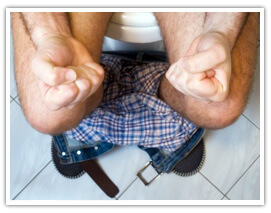
Piles Ayurvedic Doctor in Kolkata
Piles are hemorrhoids that become inflamed. Hemorrhoids are masses, clumps, cushions of tissue in the anal canal - they are full of blood vessels, support tissue, muscle and elastic fibers.
Piles can be of various sizes and may be internal (inside the anus) or external ones (outside the anus). Typically, internal piles occur from 2 to 4cm above the opening of the anus. External piles (perianal hematoma) occur on the outside edge of the anus. The internal ones are much more common.

Piles, also known as 'haemorrhoids', are small, bluish swellings, comprising of enlarged blood vessels situated either just inside or just outside the anus commonly called internal piles and external piles. In case of bleeding, they are termed as bleeding piles.
What causes Piles:
There are several factors which increase your risk of developing piles. Some of the common factors that might lead to piles are:
- Genetic tendency (due to weak rectal veins, and walls).
- Poor tone of muscle in the rectal region.
- Constipation (hard stool).
- Obesity
- Inactive or sedentary lifestyle.
- Chronic or prolonged cough.
- Pregnancy
- Excessive use of laxatives or enemas.
- Habitual weight lifting.
Because of all these factors, straining is needed to pass the small hard stools, which causes congestion in the network of blood vessels located inside the anal cushions. Gradually, these vessels enlarge and form piles. If the constipation further continues, they become large enough to be called second or third degree piles.
Internal or First-degree Piles:
Many people have these without even being aware of them. These are located just inside the anus, ocassionally causing some discomfort when a motion is passed. Rarely, slight bleeding may also occur during evacuation.
Second-degree Piles:
They usually appear as peasized swellings outside the anus after a bowel motion has been passed. They are usually retained inside the anus and may bleed and cause discomfort during passing stool with some degree of itching.
Third-degree Piles:
The swollen blood vessels are so enlarged that they remain outside the anus permanently. These are known as external piles, and are more troublesome. Soreness and persistent irritation are the common features.
Physicians of Ayusya clinic have treated the patients by two following principals
- Reduce the constipation (the commonest predisposing factor for piles).
- Relieve pain associated with piles and reduce the piles.
Doctors are providing best herbs and medicines and different life style measures to reduce the constipations. Along with medicines doctors prescribing asafoetida, fennel and cumin. Ghee, buttermilk and green leafy vegetables in diet which also reduce constipation.
Physicians are prescribing very good quality medicines to relive pain and for reducing piles along with following herbs to combat this diseases effectively.
- Carrot (Daucus carota): It is effective in reducing the bleeding from piles (can be taken raw or cooked).
- Garlic (Allium sativum): It is effective in reducing the bleeding from piles and is helpful to stop the growth of bleeding piles. Insert the garlic high up in the rectum so that it remains inside the rectum overnight.
Other herbs prescribed for treatment of piles are trikatu, cassia fistula, mimosa pudica, ailanthus excels, blumea balsamifera,and semicarpus anacardium
Contact us!
We are happy to help you..
Book Appointment
- Ultadanga Book appointment
- Gariahat Book appointment
- Howrah Book appointment

Subscribe to our Newsletter
Book Appointment
-
Ultadanga
 (0)9831775590
Book appointment
(0)9831775590
Book appointment
-
Gariahat
 (0)9831775590
Book appointment
(0)9831775590
Book appointment
-
Howrah
 (0)9831775590
Book appointment
(0)9831775590
Book appointment
Call
-
Ultadanga
 (0)9831775590
(0)9831775590
-
Gariahat
 (0)9831775590
(0)9831775590
-
Howrah
 (0)9831775590
(0)9831775590


